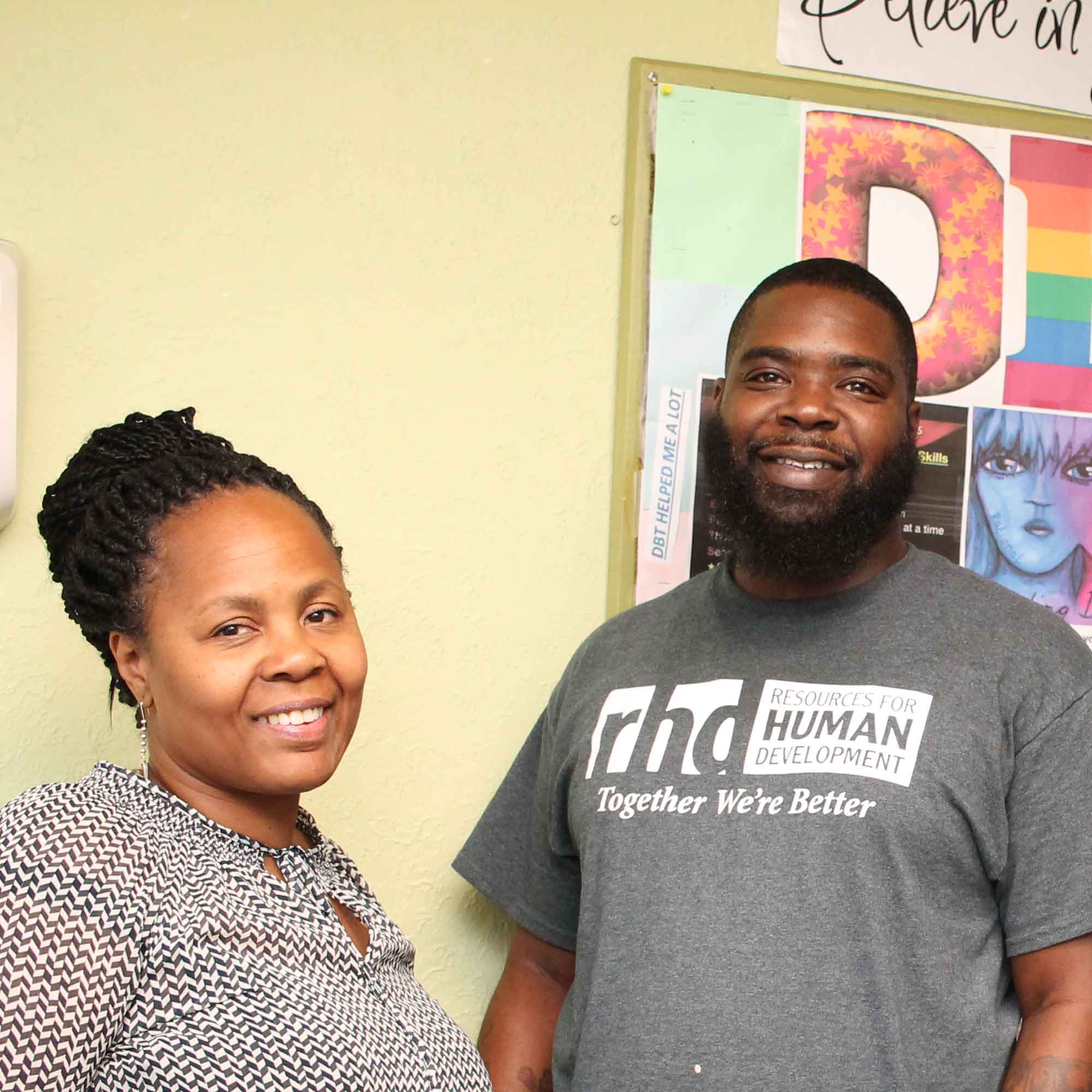
DBT: Clinical expertise supports highest quality services at RHD
Colleen is a client at RHD Wister Street, a therapeutic residential environment that helps individuals in recovery from mental health challenges with a history of forensic involvement. Colleen came to Wister Street after spending time in federal psychiatric and mental health facilities, and described herself as “delusional, paranoid and quick to get into a physical confrontation with someone.”
Today at Wister Street, Colleen says she’s learned to “experience emotions, accept them, rationalize them and think about the best outcome.” She credits, in part, Dialectical Behavior Therapy (DBT), brought to Wister Street and a number of other RHD programs by RHD’s Department of Clinical Quality and Innovation (DCIQ).
“I’ve been practicing DBT for two years now,” Colleen said. “It really helped pull me out of my psychosis. DBT keeps me from getting in trouble with the behaviors I used to display. It keeps me stable and on an even keel.”
DCIQ is one of the many advantages RHD brings to service delivery and provides clinical experience that impacts all of RHD’s diverse services with a number of specialties including sexually problematic behaviors, environmental design and dual diagnosis programs for people with mental health challenges and intellectual disabilities.
DCIQ identifies and supports evidence-based practices at programs across the corporation, and modifies these approaches to meet specific needs of difference populations. This collaborative approach delivers clinical leadership, expertise and a variety of resources to make sure RHD programs always deliver the highest quality services.
DBT was developed as a cognitive behavioral treatment for chronically suicidal individuals diagnosed with borderline personality disorder (BPD). It’s now effectively used to treat substance dependence, depression, post-traumatic stress disorder (PTSD) and eating disorders, among other things.
Dr. Susan Hunt, Clinical Director of RHD’s Philadelphia Behavioral Health & Housing Division, had led the DCIQ effort to adapt DBT for in-patient residential treatment environments at RHD. Hunt brought DBT to RHD five years ago and has helped lead innovative modifications of DBT to fit RHD’s diverse array of services.
“We decided to turn the model on its head with Direct Support Professionals implementing the therapy,” Hunt said. “We felt that DSPs have the most time and the most direct relationship to the clients, so we wanted them to have this practice and methodology.
“We did the training, and continue to do so, and once our staff at our programs started to think about things differently and try strategies for themselves, we just took off from there. It was a full culture shift.”
DBT marries the Zen concepts of true self-acceptance and mindfulness — being fully aware and present in the moment — with cognitive behavioral principles. The balance between the opposing forces of acceptance and change forms the “dialectic” for which the therapy was named.
DBT has been an effective tool to help participants gain control over their emotions and behavior, ultimately improving relationships. In addition to mindfulness, clients learn how to: tolerate pain in hard situations, improve communication when asking for things and saying no, and change emotions that they want to change.
“I looked down on myself because I have felony convictions that will be a road block for me,” Colleen said. “One of the things DBT has taught me is to acknowledge these feelings. It doesn’t mean that I give up – I keep going. I like exercising and I do deep breathing a lot. I might self-sooth by reading. Express myself to someone who is going to give me some encouragement. Do things that counteract the negativity. I am at peace with myself at the end of the day.”
Hunt and the DCIQ team implemented their unique DBT adaptation one program at a time, first teaching RHD staff how to facilitate groups and conduct on-site and in-the-moment skills coaching. RHD therapists receive ongoing training and support.
“DBT has been beneficial not only to the residents but to the staff as well,” Wister Street Director Nicole Brown. “Each week we open the staff meeting with a mindfulness exercise and it seems to bring a calm to the room which helps us focus and remain present in the moment.”
DBT is currently being implemented at a number of RHD’s residential treatment programs.
To measure DBT’s success, Hunt and the DCIQ team examined program indicators (such as the alliance between client and staff), implementation effectiveness and the correlation between DBT and lessening staff turnover. Improvements were found in all areas.
Hunt’s work was recognized nationally, as she published an abstract in Community Health Journal last year. But the real reward comes with client success.
“I’ve seen this approach change people’s lives, and for me, that’s what we’re here for,” Hunt said. “We’re supporting them in getting out there and living their most joyful life.”


